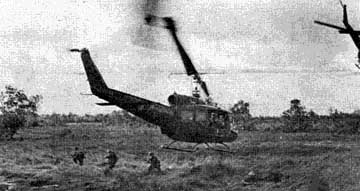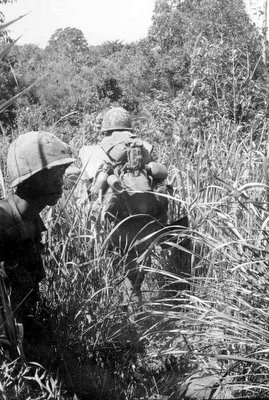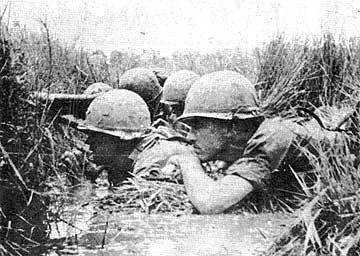Landing Zone
From Wikipedia, the free encyclopedia.
A Landing Zone or "LZ" is a military term for any area where aircraft land.
In the American military a landing zone is the actual point where aircraft land, (equivalent to the commonwealth landing point.)
In commonwealth militaries a landing zone is the cartographic, (numeric,) zone in which the landing is going to take place, (i.e. the valley.) Landing area is the area in which the landing is going to take place (i.e. the field where the aircraft are to land.) Landing point is the actual point on which aircraft are going to land (i.e. a point of the field.) Each aircraft has a different landing point.
Landing areas are most commonly marked by coloured smoke. The standard procedure is for those at the landing area to pop smoke and say so over the radio. The pilot says when smoke is seen and what colour the smoke is. Those on the ground then respond with what colour the smoke should be. Smoke of a different colour can mean the landing area has been compromised, and the pilot usually has the authority to cancel a landing.
A hot landing zone, or Hot LZ, is the place you never want to hear you are going. Hot means the landing zone is occupied by the Vietcong or NVA who will be shooting at you while you are landing or when you land.
This is a shot of a Hot LZ
http://www.25thida.com
http://www.25thida.com
 SCATTER, AND QUICKLY! Tropic Lightning soldiers of the 1st Brigade charge out of their choppers into the hot landing zone, even as the Hueys are on their way out.
SCATTER, AND QUICKLY! Tropic Lightning soldiers of the 1st Brigade charge out of their choppers into the hot landing zone, even as the Hueys are on their way out.Late one afternoon, our company was on our way back to FSB Pershing after an uneventful day on patrol. Right outside the wire around Pershing, we were told to hold up. The officers and NCOs were called together and briefed about something. When they were finished talking, we were briefed. It seems that some North Vietnamese Army soldiers (NVA) (I forget how many) were spotted and we were being sent back out to go after them. One platoon would be sent in first and radio back with what we would be encountering. If they made contact the rest of us would be sent in.
 They also told us that we would be landing in and area covered with elephant grass. I knew what that was and didn’t look forward to having to fight in that. (Here is what elephant grass looks like.) They told us to take a break and we would be resupplied before back heading out. We settled down and supplies were brought out to us from Pershing. Things like water, food, hand grenades, smoke grenades, claymores, a lot of extra ammo, even cigarettes. We received enough supplies for a day or two. I wondered why they were giving us so much, but the guys explained that this was normal for something like this just in case we had to stay.
They also told us that we would be landing in and area covered with elephant grass. I knew what that was and didn’t look forward to having to fight in that. (Here is what elephant grass looks like.) They told us to take a break and we would be resupplied before back heading out. We settled down and supplies were brought out to us from Pershing. Things like water, food, hand grenades, smoke grenades, claymores, a lot of extra ammo, even cigarettes. We received enough supplies for a day or two. I wondered why they were giving us so much, but the guys explained that this was normal for something like this just in case we had to stay.A lot of things ran through my mind while we waited to go, which I’ve long since forgotten, but one thing you can be sure of was that I was scared and that everyone was scared. They told me that being scared was normal even for the guys that had been through this before, but once things got started, I just needed to remember what I was trained to do and I would be okay. I also remember thinking that this was it. That this was going to be the first time I would come face to face with the enemy in battle. I knew it was impossible to spend an entire year in Vietnam without this happening. It wasn’t exactly what I wanted to do, but that’s what I was here for. I pretty much accepted the fact I would be going into battle and busied myself with packing up the supplies.
It wasn’t long before the choppers came in and picked up the first platoon to go hit the LZ, luckily we were not in the first group. After they took off, we gathered around the radio operator (RTO) to listen to what was going on. First they called in air strikes on the area to hopefully soften things up. When the air strikes were called off, the choppers were sent in with the troops. When they landed we heard exactly what we wanted to hear, “No resistance!” I remember feeling such a relief.
They patrolled the area for about a ½ hour or so but found nothing. It looked like once the enemy knew they were spotted, they took off or hide. One thing about the NVA and Vietcong, other than snipers, was they never fought unless you took them by surprise and they had no choice except to fight, or they were sure they had you out numbered and out gunned. I guess this time it was the latter, which was just fine with me.
Landing in a Hot LZ
There was one time we actually landed in a Hot LZ. We were picked up one morning by choppers and flown to another area for our patrol. I should remind you I liked to sit on the floor right behind the pilot. Being in that spot always meant I was one of the first ones off the chopper when it touched down and one of the last ones on when it took off. What can I tell you, I liked the view sitting there with my feet hanging out the door?
On our way in to the LZ, one of the choppers reported that they were taking on small arms fire and that the LZ would be hot. We were also told that since it was hot, the choppers wouldn’t be touching down, but hovering a couple of feet off the ground so they could take off quick. We would have to jump the rest of the way.
The choppers circled the LZ and the door gunners (M-60 machine gunners on each side of the chopper) fired into the LZ all the way down.
Once we got close to the ground, we hopped off the chopper and ran over to the berm surrounding the rice paddies, we got down and took cover. We fired a few rounds for effect, but none was returned, which made me very happy.
http://www.25thida.com

One of the guys next to me asked me if I was okay.
“Yeah, why?”
“A round hit right between your legs just as you hit the ground.”
I was pumped with adrenaline so I had to actually stop for a second to see if I could feel if I’d been shot; nothing.
“No, I’m fine.”
“That was close, your lucky.”
“Yeah.”
I don’t remember anything specific about the rest of the day, but as far as I’m concerned, that was enough for one day.

No comments:
Post a Comment